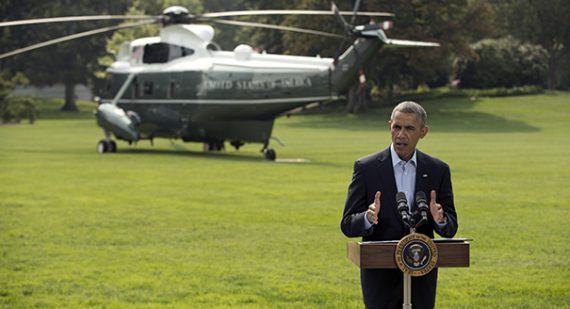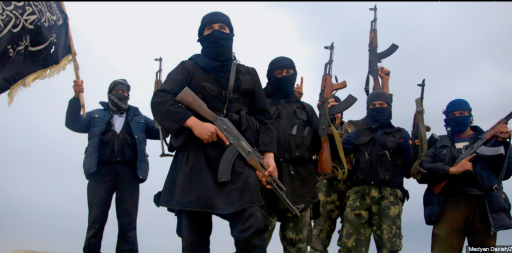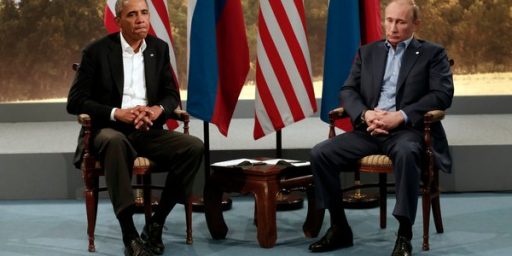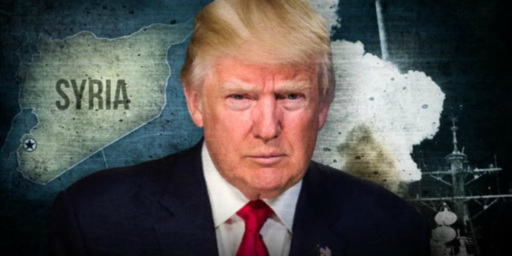Before We Go To War Against ISIS, We Need To Answer Some Questions
If the President is going to increase American involvement in the Middle East, he needs to address some fundamental questions first.
Tonight, the President will address the nation in prime time regarding the future course of American military actions against the Islamic State in light of its military advancements in Iraq, it’s attacks on religious minorities in both nations, and its recent beheading of western journalist with the threat the more would follow. Given the fact that this is a prime time speech, we can anticipate that the President will be announcing some kind of significant escalation in American attacks on IS and, indeed, today The New York Times and other news outlets are reporting that the President is “ready” to authorize expansion of the air campaign in to Syria, although it’s unclear whether he will be announcing such airstrikes tonight. In any case, however, it does appear that we are headed for a major expansion of American involvement in Iraq and, before long, Syria, in response to the supposed threat that IS poses to American national interests.
Before we head down that road, though, David Ignatius has some questions that probably ought to be answered:
● What’s the exit strategy? As Obama begins his effort to “degrade and ultimately destroy” the Islamic State, his aides told the New York Times the campaign could take three years. How will the United States and its allies know when they have “won”? Or will this be more like the Cold War, a decades-long ideological battle punctuated by periods of intense local combat? If so, are the American people ready for such a long and patient struggle?
● If Obama is serious about using U.S. military power against the Islamic State, why has he initially been so tentative? Militarily, a sudden, sharp attack makes more sense than a drizzle of airstrikes. There may be sound political reasons for the cautious U.S. approach, to force countries in the region to step up and make commitments themselves, but this goes against military logic.● The United States may begin with the limited goal of helping allies fight the Islamic State, but what if the campaign goes badly, or it spreads more widely to Pakistan and Saudi Arabia, or the U.S. homeland is hit in retaliation? We may plan a restrained campaign, but the enemy gets a vote. Won’t the United States inevitably have to escalate if it seems to be losing?
● What about the jihadists’ haven in Syria? The United States learned in Vietnam and Afghanistan that it’s almost impossible to stop an insurgency that maintains a strong logistical base across a protected border. If the United States intends to strike targets in Syria eventually, how does it avoid becoming the air force of Syrian President Bashar al-Assad?
In all of the reading that I have done on this burgeoning conflict in the past several months, and all of the commentary we’ve seen about it from talking heads, Members of Congress, foreign policy analysts, and Administration officials on the various news programs that seem to crowd the television schedule, I can’t say that I have seem very many coherent answers given to these or any of the other questions that Ignatius poses in his piece. Instead, there is much commentary about how the Islamic State — or ISIS or ISIL or whatever you choose to call it at this point — is a grave threat to American interests, how they have threatened to strike in the United States and Europe, and how they threaten to redraw the map of the Middle East. We’ve also heard plenty of reports of the human rights abuses that the group has committed against religious minorities in Iraq and, of course, the beheadings of journalists James Foley and Steven Sotloff. Even accepting all of this as true, though, none of it answers the serious questions that ought to be discussed before we escalate our involvement in this conflict to the point where extracting ourselves will prove to be difficult if not impossible while further escalation will be inevitable, just as we saw in Vietnam, Iraq, and Afghanistan.
For example, as Ignatius asks, later on the article, how are we going to extract IS and its supporters from the urban centers that it has taken control of in Iraq and Syria. We’ve learned by now that air power has a limited ability when it comes to targets in large cities, and extracting determined fighters from such areas requires boots on the ground. Presumably, the Obama Administration hopes that the Iraqis will be able to do this by themselves, but their own record of fighting IS on the ground has been less than stellar. What happens if they can’t do it? Do we then send American ground forces in notwithstanding the Presidents vows in the past months, which he will presumably repeat tonight, that there would be no American “boots on the ground?” Even if we don’t want to do that, we may find ourselves with no choice in the matter once we commit ourselves to the fight. Nobody intended that the invasion of Iraq or the war in Afghanistan would turn into decades-long occupations that resulted in the deaths of thousands of Americans, but that’s exactly what happened. What assurances can the President and those Republicans in Congress beating the drums for war provide us that the same thing won’t happen again?
Dave Schuler raises a related question, that is probably one that we ought to get an answer to before even getting to the ones Ignatius raises:
What is the U. S. interest? If it’s avenging the deaths of two young Americans who put themselves in harm’s way with foreseeable consequences, it returns to the point I made a couple of weeks ago about the War of Jenkins Ear. Is that really a reason to go to war?
If it’s to remove threats to our security, our security will remain threatened as long as the factors that produce and enable the threat are in place. Those factors are both at home and abroad. As long as those factors remain going after Osama Bin Laden or Al Qaeda or Afghanistan or Saddam Hussein or IS are just disconnected actions without strategic unity.
As I’ve said repeatedly, I don’t object to not going to war. I do object to lurching uncontrollably into war without articulating our interests or objectives. It’s up to President Obama to articulate those interests, lay out the objectives, and produce a plan to achieve them.
This, it seems to me, is the first question that must be answered.
Notwithstanding the hyperbole of the media, it seems rather apparent that IS is not an immediate threat to the United States despite the threats that they have made to bring the battle to America’s shores. In no small part, this is because it seems clear that, leaving aside their military success against an Iraqi Army that doesn’t seem to want to fight and “moderate” Syrian rebels that are clearly weaker than IS forces, they don’t have the capability to strike in the same way that al Qaeda did (and even in that regard it’s worth noting that that 9/11 attacks took several years of planning.) Additionally, though, it seems clear that IS’s ambitions lie elsewhere at the moment. If anyone should be concerned about the immediate threat from IS, it should be nations like Lebanon, Jordan, and Saudi Arabia, which bears at least some responsibility for all of this given their role in providing arms to the Syrian rebels regardless of whether they were “moderates” or jihadists. Given that, it seems fairly clear that describing IS as an immediate and grave threat as much of the current rhetoric has done is extremely hyperbolic to say that least.
If the President wants to accomplish something tonight, he would answer these questions. Unfortunately, he probably won’t.







The threat to the US is over-hyped by ignorant chicken- hawks, a stenographer pool media, and the dupes who buy their crap.
Let those with greater interests deal with this…show some leadership…and then we can pitch in and lend a hand.
Israel…our “greatest ally ever”…says ISIS is the same as Hamas. Fine…do something about it. Or can you only kill innocent children?
Iran is doing more on this front than Israel.
As you say…Lebanon, Jordan, and Saudi Arabia.
China, for fvcks sake, has a greater interest in this than us.
I fail to see why the US has to take the lead on this. Seems to me this is all driven by domestic politics which is the worst reason. What is the role of Saudi Arabia, Turkey, Jordan? They have enough weaponry to deal with this. We should be just supplying what they don’t have: satellite imagery, surveillance, communications, etc.
I fear we have learned nothing.
I see two national interest issues here:
1. Protect our ally the Kurds, who themselves are a buffer to Turkey, a NATO ally.
2. Prevent ISIS from developing a capacity to strike at the US, which ISIS appears wont to do. ISIS itself appears to be wanting to organize a nation-state and it does have some resources.
This is maybe a matter of killing the baby crocodile before it becomes a full grown man-eater.
I do know one thing: the non-interventionist tactic of ignoring what’s happening in Syria in the hope that it will work itself out without endangering US interests hasn’t worked.
Doug, I agree with everything you’ve said.
I’d only add that the ‘sanctuary’ which ISIS has is really support from donors in Saudi Arabia and other Gulf States.
Rather than starting yet another endless war / campaign / whatever we want to call it this time in the middle east, why not take that money and invest it here in things like port security, schools, border security, and other items – perhaps take a look at air safety, rail safety, and other items where we could reasonably be attacked – ISIS isn’t the only group that would like to attack and they won’t be the last. Taking pot shots at them from the air and watching them or a new group of extremists grow back in their place down the road isn’t going to change anything.
FYI.
Saudi armed forces (from Wikipedia):
The Saudis, I think, can take out the ISIS Toyota pickups themselves. If they chose to do so.
There is no doubt that this ISIS must be defeated totally. This will take a combination of containment, control of supply lines, seizure of bank accounts, air strikes, drone strikes, special ops missions, take prisoners, and direct assaults. This should be a joint effort, much like the Allied forces in WWII. This would include Arab countries, Turkey, Israel, maybe India and Iran. One report this morning said that Al Quiada is even against ISIS and could be a partner. Weird! Those who murdered Foley and Sotloff must be captured and tried for murder. All of those resposible for executing, torturing, and harming anyone must be identified and either captured or killed. If not, they will go on killing innocent people.
Read the statements by Lt. General Hertling on CNN: any attacks in Syria will require careful and lengthy planning. General Dempsey says that ISIS has an “apocalyptic, end of world” view and must be defeated.
I think it would be unwise for the president to give details and specifics. You don’t tell the enemy what your plans are. “Everything is on the table” and “whatever it takes” will be sufficient. Also, “hasta la vista, baby !”
@Scott: but why would they want to do that when we will do that for them? it is much cheaper this way for them in every way – won’t alienate anyone in their country or cost them a dime in money, lives or equipment.
And the last thing we should we should do in this regard is listen to anything Dick Cheney has to say on the topic…unlike the House GOP.
@Tyrell:
Our own fundamentalists have the same view. They call it the rapture. But it’s just as dumb by any name.
@Tyrell: I have to disagree. ISIS is just not that big or powerful. This is overkill. Plus they want this conflict. That alone is enough to give pause.
I also suspect that this is as much a PR move as a response to a threat. I read that ISIS has maybe 40 thousand fighters; how can they be much of a threat to the US? Declaring themselves a caliphate does challenge the House of Saud which is the current leader of the Sunni world by virtue of their guardianship of Mecca and Medina and possession of a lot of petroleum. Of course, the US is the designated champion of the House of Saud, but that is a different story.
The media has been full of stories about Obama showing weakness in the face of the worst threat to ever come down the pike, worse than the worst threat we ever faced, worse than ebola laden sharks carried by millions of Guatemalan children across the Rio Grande coming to get your mama. So Obama will do something.
I am reminded of the VA. I remember when that was the worst scandal ever faced, as bad as two Teapot Domes multiplied by three Watergates. Then somebody got fired, and somebody got hired, and very little changed, and we all moved on to the next worst thing that has ever happened in the history of the world which was that the president played golf on his vacation.
My state better legalize marijuana soon because I need to relax from facing the worst thing that has ever happened day after day.
@Tyrell: The president should fly onto an aircraft carrier and strut and maybe spit a few times before doing the announcements. B/c everyone knows it is all about how John Wayne you come across. The key is the sound bite and the picture. Sorry if listening to the same Generals that sold us a bill of goods in Iraq for so long doesn’t convince me of much. How many rosy pictures of the situation on the ground did we get for years in Iraq esp about the Iraqi forces? Granted Hertling has a bit more credibility since he is now retired and not a pawn of the president but, I just don’t trust the word of the Gen Officers anymore. Not with them gunning to get rid of sequestration so bad.
Man, what’s the point of having allies in the region if they don’t bother fighting in their own region? Didn’t the UAE and Egypt carry out airstrikes in Libya?
This kind of crap is the sort that sees me not voting on Election Day. We’re stumbling to war based on the production values of two snuff films. While that may frighten journalists, that sort of panic shouldn’t spread into Washington so damn easily. And it wouldn’t if our stenographers weren’t in bed with politicians.
The real question to answer is what are the chances the Democrats/Progressives turn against completing the job, give away the gains and leave soldiers in the field, like they have in the recent wars? I’d say 99.9999%
@ JKB
What “gains” have we made in recent wars?
@anjin-san:
We made huge gains in Iraq…for Iran.
@JKB:
Gains? Our decision to invade Iraq in 2003 destabilized that region and effectively shifted the balance of power in the region to Iran, and created the environment in which ISIS is now operating. “Democrats /Progressives” like Dick Cheney, Don Rumsfeld, and GW Bush were responsible for this foreign policy failure. Also, it was Bush who signed off on the plan to leave Iraq, and later when Obama pressed Al-Maliki on our desire to maintain a presence, al-Maliki declined the offer citing the 2007 agreement to have us leave.
@Tyrell:
“There is no doubt that this ISIS must be defeated totally.”
Show your work, please. To me, this is a massive overreaction to a group which is barbaric enough to behead 2 American non-combatants and post the video on-line, but which is no signficiant threat to US citizens not in the region. Continuing with airstrikes to ensure our allies win against them is sufficient, without defeating them totally.
@JKB:
Yeah, stupid liberals, snatching defeat from the jaws of victory in
VietnamIraqAfghanistanIraq again.This whole debate is insanely depressing. Let’s just ride the bomb with Major Kong, and party like its 2003.
As David Ignatius says, it is necessary that Obama and our military and diplomatic leadership have a plan, have an exit strategy, and in the plan, have figured out what to do with Syria. It is not necessary, or even desirable, that they share this plan with David Ignatius.
This is all starting to feel like a Sykes-Picot rescue mission. I am just not convinced that maintaining the territorial integrity of Syria and Iraq is so important. I don’t think the hair-on-fire crowd has made its case and I don’t like going to war on a wave of emotion over two murders.
That said I think we must protect the Kurds and Jordanians as well as the KSA. We don’t need to be talking in apocalyptic terms to accomplish that.
Our oil interests must be in danger. That’s the only reason I can think the administration would contemplate putting our men and money back into a militarily unwinnable situation.
@JKB: “The real question to answer is what are the chances the Democrats/Progressives turn against completing the job, give away the gains and leave soldiers in the field, like they have in the recent wars? I’d say 99.9999%”
I’m sorry, but who was the guy who negotiated the ‘cut and run’ treaty?
Who were the guys who were deeply in bed with the Saudis who very carefully didn’t punish them for Al Qaida?
@gVOR08: “As David Ignatius says, it is necessary that Obama and our military and diplomatic leadership have a plan, have an exit strategy, and in the plan, have figured out what to do with Syria. It is not necessary, or even desirable, that they share this plan with David Ignatius.”
Last time we heard talk like that, it ended with ‘Trust Bush and the ‘Wise Men’, they know what to do and have secret intelligence’.
I partially agree with your point. But there is legitimacy to not telling the entire world, including the targets, about your military plans. There was no legitimate reason for Bush and Co. to lie wholesale about the reasons for the war in Iraq. I agree with commenters above that the threat of ISI* to the US is exaggerated, but I don’t expect Obama is going to have to lie much to sell taking action.
@JKB:
You are such a liar.
@Tyrell: Sir, I had insulted you many times, but I am now convinced that you are obscure genius, a wonderful practitioner of the under-appreciated art of trolling. The alternative, that someone who is lucid enough to not be hospitalized in a mental ward and sill write this drivel, is too terrible to contemplate.
In Dan Froomkin’s piece at The Intercept, he quotes Ret. Army Col Douglas Macgregor who nails this
I suggest the entire piece he asks much more important and better questions about this new plan to attack ISIS than Ignatius.
@humanoid.panda:
Yeah, when his posts get all “aww, shucks” in tone, I get the feeling he’s a really talented troll.
@Neil Hudelson: @humanoid.panda:
I’m 99% sure he’s the Tsar reincarnate. I hope so. I miss that guy.
Letting the Iraqi army fight with our air support…..let the Iraqis fight and defend their state democracy without our boots on the ground…boy, why don’t we just call this strategy “Iraqinazation” since this has been such a winning strategy which we have used before.
ISIS is the new Viet Cong and the Iraqi Army is the new ARVN. If Vegas were making the odds, who do you think they would pick to win?
Is there no limit to our stupidity?
@CB:
C’mon…I don’t always agree with him….but he’s no Tsar. Maybe Jan?
This is not complicated. The Saudi’s feel threatened by ISIS, probably with justification. No too long ago, they had unfettered access to a highly sympathetic White House, and felt, also with some justification, that Bush was on the payroll.
Now they have to employ different tactics. So Fox whips up a frenzy about ISIS being a superhuman treat that is going to kill us in our beds if we don’t DO SOMETHING!! right away.
Bottom line is that the Saudi’s view us as the help, and they are unhappy that we are not rushing in to solve their problem in a more timely manner.
@anjin-san: Onward Christian soldiers.
And it smells like the Saudi’s initially funded ISI*, then lost control of their monster.
@gVOR08: I think you’re right, that they lost control. Could also be they drove it themselves: It wouldn’t be the first time if the interesting New Yorker piece is correct about 9/11, the Saudi regime and 2nd level people, and unpublished details of the connection between them.
http://www.newyorker.com/news/daily-comment/twenty-eight-pages
Unintended consequences are a bitch…
Once again, a presidential administration would save itself a huge amount of grief and money if it just applied the Powell Doctrine to whatever foreign adventure it wants to get involved in.
@al-Ameda:
Bit will be so happy that you finally realized how they are all really liberal Democrats.
Since we are still in Afghanistan and never really left Iraq, I have to question the wisdom of his latest plan. I think Ignatius is right. Are we really willing to have yet another failed policy in the Middle East with it’s attendant loss of life and the new request for 500 billion dollars which may go down the drain as previous funds have? How many lives and how much money are all the other countries willing to risk? The coalition of the willing accomplished nothing of value. Will this latest “coalition” go down in flames? Based on our previous middle east history, it might.